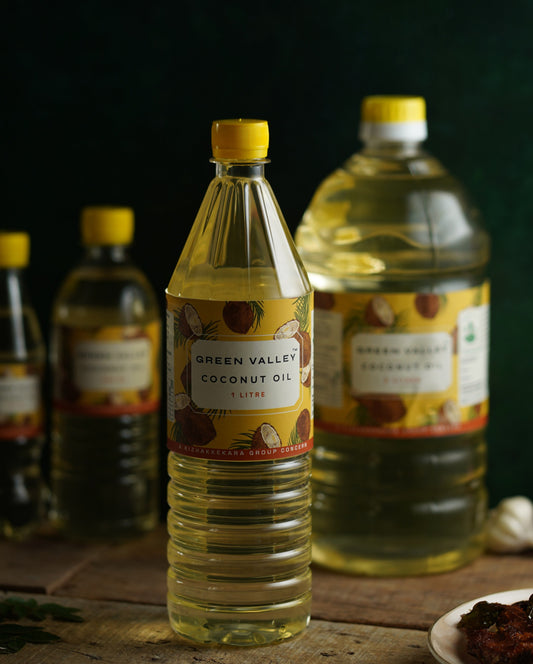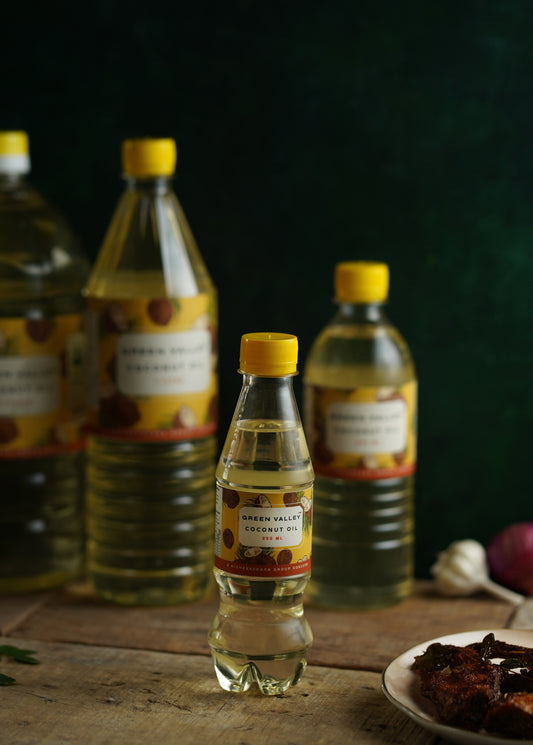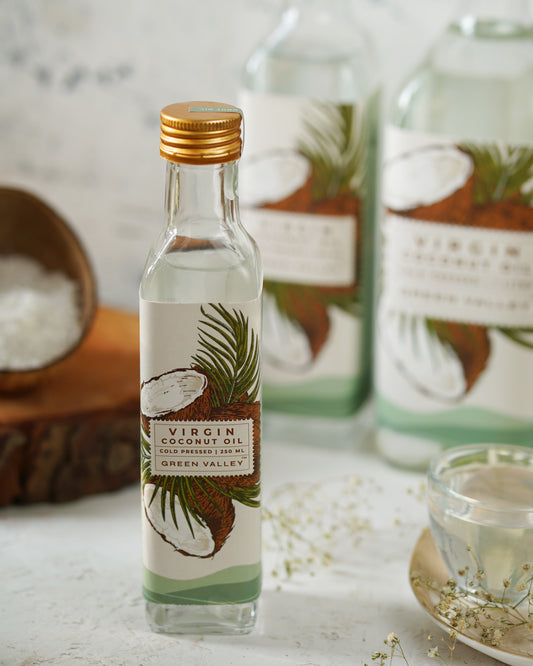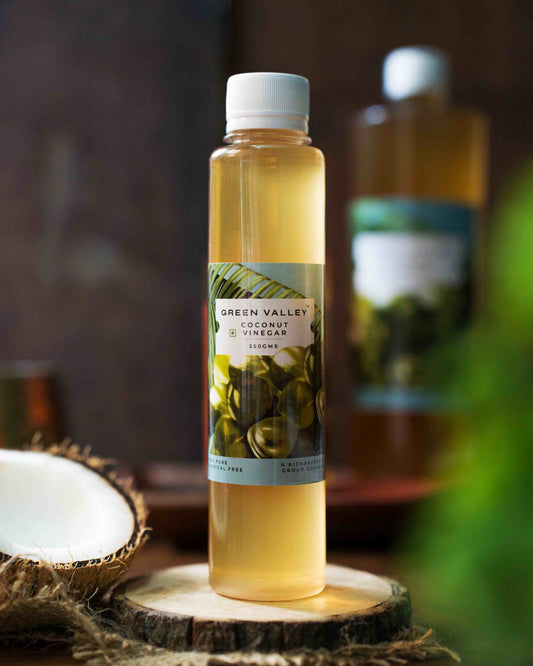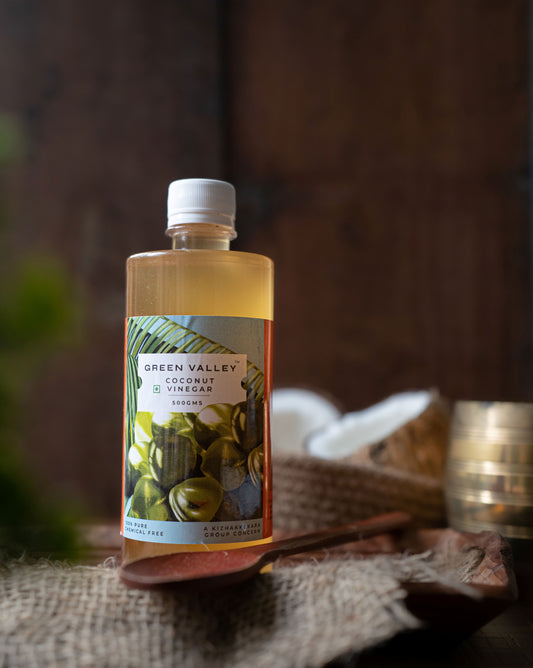Coconut Oil has long been crowned as the queen of DIY beauty treatments. If you are a natural skincare aficionado, you must have watched about a million YouTube videos and Instagram reels with home remedies that include coconut oil.
But if you are new to the whole “natural health” aisle, you must be hesitant to slather it on your face, hands, or elbows, without knowing the facts first. So we are here to answer your queries.
Is coconut oil actually good for your skin, or is it just another overhyped trend? Buckle up, buttercup, because it’s time to separate coconut oil fact from fiction, and explore what makes this tropical elixir such a skin-care superstar (or not).
What’s In Coconut Oil?
Before we dive into whether coconut oil deserves a spot in your skincare routine, let’s talk about what makes it tick. Coconut oil is a natural extract derived from—you guessed it—coconuts. It’s high in medium-chain fatty acids or medium-chain triglycerides (MCTs) like lauric acid, myristic acid, caprylic acid, and palmitic acid, which give it powerful properties that are key to its skincare benefits.
Lauric Acid (≈ 50% of coconut oil): Known for its antimicrobial and antibacterial properties, lauric acid is one of the reasons coconut oil gets so much attention in the beauty world.
Caprylic and Capric Acids: These fatty acids bring additional antimicrobial benefits to the table and help improve the skin barrier function.
Vitamin E and Antioxidants: Coconut oil also contains small amounts of vitamin E, a known skin-soothing antioxidant.
So, what do all these fancy-sounding compounds do? And how do they help your skin? Let’s break down the benefits of using coconut oil on your skin.
1. Moisturization
One of the top reasons people reach for coconut oil is its ability to lock in moisture. If you’ve ever slathered a little on your skin, you know that rich, luxurious feeling that makes you wonder why lotion even exists. Coconut oil works as an emollient, forming a barrier on the skin’s surface that traps moisture and keeps the skin soft and hydrated.
The fatty acids, particularly lauric and myristic, also help the oil penetrate the skin deeply. This is great news if you have dry skin or suffer from conditions like eczema, which often leave your skin feeling parched. In fact, studies have shown that coconut oil can be just as effective, if not more so, than mineral oil at treating dry skin conditions. The best part? It doesn’t come with a cocktail of synthetic chemicals.
That said, not all skin types react the same way. If you have oily or acne-prone skin, you might want to proceed with caution (more on that later).
2. Antimicrobial Properties
Remember the lauric acid we mentioned earlier? It’s not just a cool name—it’s a powerhouse when it comes to fighting off bacteria, viruses, and fungi. Studies have shown that lauric acid has antimicrobial properties that can help combat skin infections. This is why coconut oil is often used as a natural remedy for minor cuts, wounds, and even acne. Its ability to fight off bacteria can prevent infections from taking root.
Now, before you start bathing in coconut oil to ward off every skin issue, keep in mind that its effectiveness can depend on the severity of the condition. For minor irritations, coconut oil can be soothing and protective. But if you have a serious skin infection, it’s time to call in the professionals (a.k.a. your doctor).
3. Anti-Inflammatory Effects
Coconut oil’s anti-inflammatory properties are another reason it’s celebrated in the skincare world. If your skin is red, itchy, or inflamed, a bit of coconut oil may provide soothing relief. Research has suggested that coconut oil’s antioxidants can help reduce inflammation by neutralizing free radicals—those pesky molecules that contribute to inflammation and skin aging.
In practical terms, this means that coconut oil can be useful for soothing conditions like psoriasis, eczema, and dermatitis. Just rub a small amount onto the affected area and let its calming powers do their thing. But remember: everyone’s skin is different, so it’s a good idea to patch the test first if you have sensitive skin.
4. Anti-Aging Properties
Speaking of aging, coconut oil might just be your new best friend. Thanks to its high antioxidant content (thanks to vitamin E), coconut oil can help fight free radicals that cause premature aging. Regular use may help reduce the appearance of fine lines and wrinkles, leaving you with smoother, more youthful-looking skin.
Coconut oil works by hydrating the skin, improving elasticity, and strengthening the skin barrier. Plus, that silky texture can make your skin feel luxuriously soft, even if it doesn’t magically turn back time. No anti-aging product is a miracle worker (despite the fancy marketing lingo), but coconut oil is a natural and affordable way to keep your skin looking and feeling great.
5. An All-Natural Makeup Remover
If you’re someone who’s struggled to find a makeup remover that doesn’t leave your skin burning or covered in weird residue, coconut oil might be a game-changer. Its unique structure allows it to break down makeup, dirt, and impurities while still being gentle on the skin. Just massage a small amount onto your face, watch even waterproof mascara dissolve like a bad memory, and then rinse with warm water or a gentle cleanser.
Not only does coconut oil leave your skin clean, but it also nourishes and moisturizes during the process. It’s like getting a mini facial every time you remove your makeup. Just be mindful if you have oily skin—you might want to double cleanse afterward.
The Downside: Is Coconut Oil for Everyone?
Okay, now for the real talk. While coconut oil has a laundry list of benefits, it isn’t a perfect match for every skin type. Its thick, heavy consistency and ability to lock in moisture can actually clog pores for some people—particularly those with oily or acne-prone skin.
If you’re unsure how your skin will react, start with a patch test. Apply a small amount of coconut oil to a less visible part of your face (or anywhere on your body) and watch for any signs of irritation or clogged pores over the next 24-48 hours. You're set to go if your skin reacts nicely!, there are plenty of other natural oils you can explore, like jojoba, argan, or rosehip oil.
Using Coconut Oil in Your Skincare Routine: A Guide
If you’ve decided to give coconut oil a whirl, here are some ways to incorporate it into your skincare routine:
1. Moisturizer: Apply a small amount to dry areas after cleansing for all-day hydration.
2. Lip Balm: Dab a bit onto your lips to soothe chapped skin.
3. Body Scrub: Mix coconut oil with sugar or salt for a natural exfoliant.
4. Makeup Remover: Gently massage onto your face, then wipe off with a soft cloth.
5. Face Mask: Combine coconut oil with honey or other natural ingredients for a DIY face mask.
Final Verdict: Is Coconut Oil Good for Your Skin?
Coconut oil can be a skincare superstar, especially for those with dry or normal skin types. Its moisturizing, antimicrobial, anti-inflammatory, and antioxidant properties make it a versatile addition to many routines. That said, it’s not a one-size-fits-all solution. If you have oily or acne-prone skin, approach with caution and do a patch test before going all in.
Used wisely, coconut oil can nourish, protect, and soothe your skin—all while leaving you smelling like a tropical paradise. So go ahead, give it a try, and see if this natural wonder deserves a spot in your skincare routine. Who knows, your skin might just fall in love!



